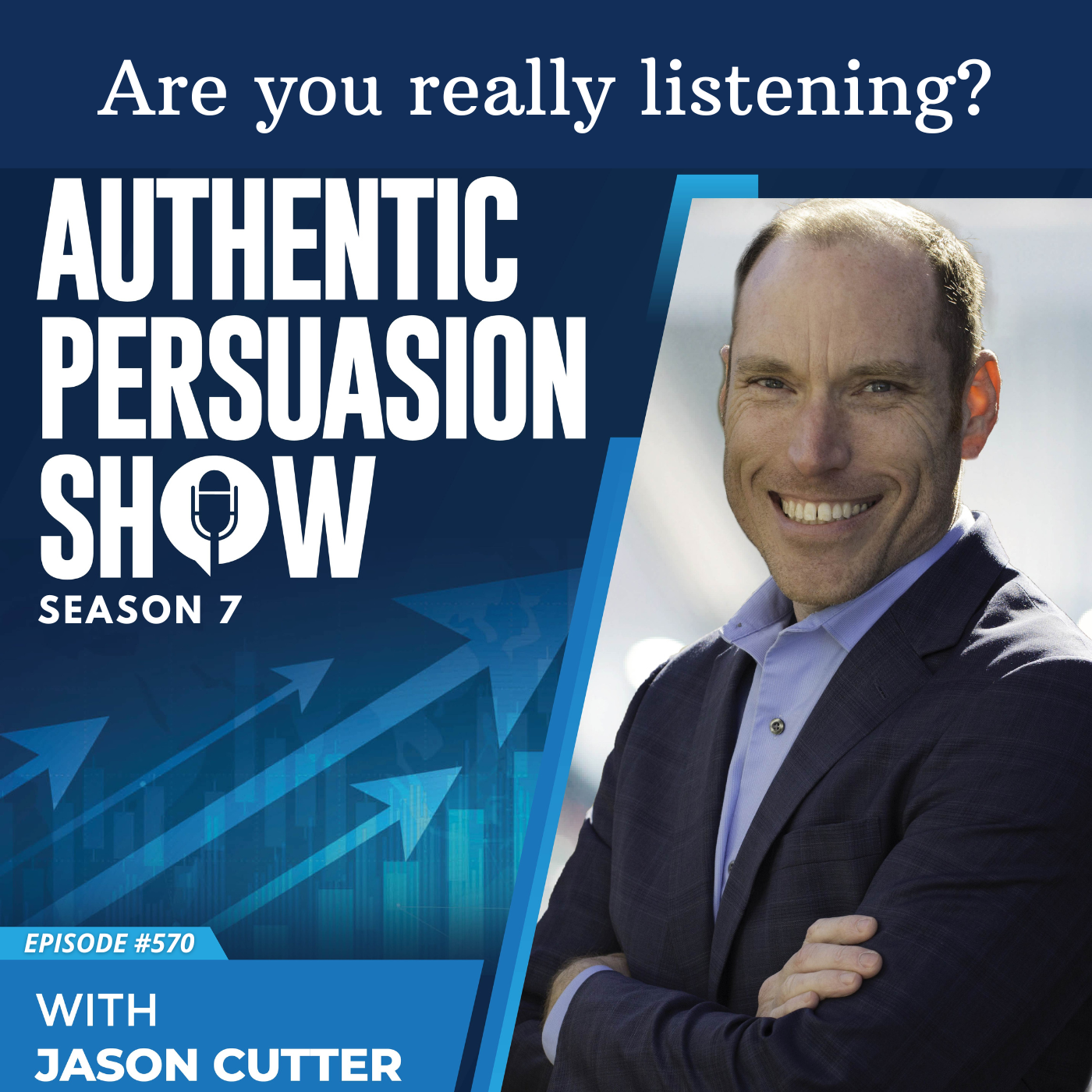Show Notes
This is part three of the conversation I had with Jamie.
In Part 3, Jamie and I talk about:
- Treating your sales role like its your own business
- Being competitive in sales and knowing your numbers
- The lag effort of low effort
- Taking time off, avoiding burnout, getting back into the groove
Download The Power of Authentic Persuasion ebook
Enroll in the Authentic Persuasion Online Course
Connect with Jason on LinkedIn
Connect with Jamie on LinkedIn
Jamie’s Bio:
My calling is helping people be less afraid of death. By helping them to provide their loved ones with a planned and funded funeral or memorial service, they create a path for bereavement, long before it’s needed. Truly, I help people live a better, more meaningful life.
A seasoned speaker, I bring deep experience in death care to a broad range of audiences around the country, sharing insights and approaches on how to have those difficult conversations and how to address sensitive issues. Extending well beyond death and dying, my message resonates across industries and individuals, bridging my passion to demystify death while enlightening communicators on overcoming challenging conversations.
Her Links & Contact Info:
Linkedin: https://www.linkedin.com/in/jamie-sarche/
Twitter: https://twitter.com/jamie_sarche
Phone: 720-403-6772
Email: [email protected]
Interesting Videos of Jamie:
More Video: https://elitalks.org/death-rituals-creating-jewish-life
E158 – Transcript
Jason: Welcome to the sales experience podcast. My name again is Jason Cutter. So glad that you’re here. This is part three of my conversation with Jamie sachet where we talk about her funeral sales service. So it’s a very interesting business model. I wouldn’t have thought that that was a thing that she does and how she does it is so amazing and I really appreciate kind of her approach on it. And there’s a lot of this in this conversation we talk about, which is useful for salespeople. I think it’s very helpful for salespeople and sales managers and business owners who have a sales team where you can take little nuggets out of the conversation that she and I had as well as, I think this is just a fascinating topic and makes for a really interesting listen to, you know, the kind of thing that she focuses on and the fact that there’s literally a business and an industry out there for everyone. So here you go. Here’s part three, enjoy.
Jamie: That’s what he needs to feel comfortable with this. Yeah. That’s really on the far end,
Jason: Especially updating it yearly, right? There’s one thing to have a plan and then to be that involved. But Hey, you know,
Jamie: But it just fits where he is, you know, like he is a very detail oriented person. He’s had to be in his career. It served him very, very well and that’s just what he’s going to do, which is great. You know, I’m happy to do whatever he needs because that’s what I do. I meet people where they are.
Jason: So on a different side note or a different kind of vein of conversations here, you’re in a sales business, you’re selling you’re a sales person, right? Like you know, you consider yourself a salesperson, correct?
Jamie: I do, yeah. And I’m painfully by commission, so.
Jason: Okay. So based on that, in this, I won’t say strange, but there’s definitely different sales vertical that you’re in. Do you have a quota or goal per month, per year? Like how does, how is that structured for you and what do you focus on? Like a number of new clients or total revenue?
Jamie: So one of the things that’s unusual with my setup compared to a lot of people who would do what I do, I’m not employed actually by the funeral home that I work with. I only work with that funeral home, but I am paid by the insurance companies that fund the plans that I do for people. So I get to set everything I want on my own. I don’t, I mean there is an owner of the funeral home and we work deeply in partnership with each other, but he doesn’t view me as his employee. You know, I’m not because he doesn’t pay me, but we are like business partners, like really close business partners and it’s really lovely because he benefits because he has really empowered me to do all this stuff and he has also allowed me to be another face of our funeral homes.
Jamie: So he is getting incredible marketing. Yeah. And sales people see me in that in the world and that he doesn’t pay for that. And so I am really an incredible face of our funeral homes. So he really benefits and I really benefit because he will allow me to do anything that I think is important and he funds all my marketing. So it’s really just an incredible symbiotic relationship. And it’s not normal for people who do what I do. Most people who do what I do would be an employee of the funeral home. They would be required to make a certain amount of phone calls a day. Like I know somebody who works for a corporate funeral home, he makes 120 cold calls a day. Wow.
Jason: I never do that. And I guess you know from a business development standpoint, there’s no shortage of people to call Raymond and 7 billion people.
Jamie: Right. And a lot of funeral homes even use like call centers to make the initial contacts. I would just never do that. And again, I think that so much of why I am successful is because I do it in a much more personal way and I’m allowed to.
Jason: Yeah. So then you have an arrangement. So you’re basically paid by the insurance companies and then is there like a goal? Do you have so much like without specifics necessarily or whatever that might be, you know, you want to share, but I’m just imagining like most salespeople, managers, owners, they have a quota set for the sales team numbers. Yeah,
Jamie: I’m super competitive. So yes I have numbers in my own head but nobody said that for me. So I worked with two different funeral, excuse me, two, two different insurance companies, one of which I do the vast majority of my plans and I always win, you know, a trip to a conference and then I win the president’s club and then maybe I’m in the million dollar club and so it is important to me and then my funeral home benefits by that. But you know, if I have a bad month, like I had really a bad month in October, like literally, I don’t think I did a single plan and that felt terrible to me. You know, nobody talk to me about it. I talked to myself about it a lot, but I’m not even sure that Jim who owns the funeral home knew cause he doesn’t watch me like that, which is really unusual.
Jason: And was there, speaking of that, you know, kind of off month because this happens to everyone in sales and since you brought it up, was there anything that you, you know, in, in retrospect, cause I know you’re a professional at all of this, so was there something that you could point to that caused it? Was it a lack of marketing, a lack of networking?
Jamie: It was a lack of calls. I wasn’t, I had been out of town and I don’t know about you, but like, even though I’ve been doing this a long time, I still have to gird my loins to make calls. And so I didn’t do it. I wasn’t feeling good about it. And it was just really a psychological thing for me. The good news is I’ve been doing this long enough to be able to recognize that’s what’s happening and to call myself out on it. And also I have the wherewithal to know I will get better. And sometimes you just have to listen. I mean it’s almost like when you’re, you’re really into an exercise regime and then one week you just can’t get yourself there. Maybe it just need a little rest and then you get back to it. And so that’s really what I do. I really acknowledge, okay, I’m just really having a hard time right now. I’m going to give myself the breathing room that I need and again, I’m successful enough and like plan my finances enough to be okay with that.
Jason: Yeah. And I think that’s huge because like the gym example and with sales, business, life, anything, whatever it is, there’s a point where you get to where you just either need a break or you can feel it coming. Not necessarily burnout, right? Because I think burnout is usually a symptom of doing something that you don’t really want to do and pushing yourself too hard and there’s also a point no matter what, where you need to have that rest period that rest day from the gym, that downtime from work. And then I think the key really is two parts, which is one, not to judge yourself harshly. I used to judge myself really harshly for not doing what I need to do or not getting to the gym or not making the calls or not working enough or putting in enough hours or doing everything and, and then, you know, having the downtime or taking time off on the weekend when I don’t feel like I should or deserve it.
Jason: And then realizing that, no, not to judge it. It’s a long game, right? If we’re talking about preplanning, but life is usually very long and every day is important. You want to make the most of every day. And in retrospect, you know, those days that you don’t do something, don’t matter as much, you know, and don’t judge yourself harshly and give yourself some latitude, which I think is important. And then the second part of that is to also then rebound quickly and come back because you also don’t want to make one day not going to the gym into three, into five and two 30 into 10 years. You’ve got to take that downtime and then you’ve got to figure out a way to get back on the horse.
Jamie: No question. And one of the other things I want to underline of what you said is don’t judge yourself harshly because that harsh judgment sometimes makes it even harder to get back on the horse. Yeah. To just be able to say, okay, I’m not doing what I’m supposed to and now I’m going to get back on.
Jason: Yeah. And if you’re in sales and you’re having that point where you’re at that point where you’re just struggling, you’re not motivated, you don’t want to do it. Sometimes it’s good to take a break, maybe take some time off or shift what you’re doing in your work day and maybe you know, you’re, you’re struggling, you’re, you’re really resisting the phone calls. Why are you resisting? Are you just worried about feedback or you just like need a break, try some other networking, try some other strategies, maybe, you know, work on whatever you can, and then set a goal and a timeline of, okay, but then I’m going to get back to it on this time. And you know, obviously keeping in mind that when you’re not productive, you’re not putting in those calls. The effort, the meetings, the networking, the face to face, your pipeline will suffer. There will be a lag, the fact where you’re then without sales and so you’ve just got to understand that and be fully prepared.
Jamie: Yeah. And then sometimes you just really have to start over from zero, which is okay. Yeah. I think that being able to say, okay, you know, I’m not feeling good about making phone calls. I don’t know about you, but sometimes I start taking this stuff really personally and I start thinking like, get a call. I’ll call somebody and they answer their cell phone and they’re like, I cannot believe you’re calling me. I am in the cardiologist’s office and you know, they think that I’m being ambulance chasing. I don’t know that they’re in the cardiologist’s office and I have to be gentle with myself when they’re mean to me and recognize that I am pushing their buttons because of something that is going on with them, but it’s not about me. And so sometimes being able to separate that who I am from what I do. Sometimes it gets a little bit more difficult to do that and so then I have to just be able to think about it and again, I’ve been doing this long enough, then I know how to talk to myself about it and how to get back out of that idea that I am responsible for how they respond.
Jason: That’s it for part three of my conversation with Jamie. We’ve got one more coming up tomorrow, so make sure to subscribe everywhere podcasts are sold so that you can listen to this as soon as it comes out and make sure if you haven’t listened to the first two parts, you can go to cutterconsultinggroup.com you can find the transcript, all of Jamie’s links. You can also connect with me on there and then you can follow me on LinkedIn where I post a lot of information. You’ll find this show, these episodes as well as always keep in mind everything in life is sales and people remember the experience you gave them.
![[E158] Selling The One Thing Everyone Needs with Jamie Sarche – Part 3 of 4](https://episodes.castos.com/salesexperiencepodcast/images/Jamie-Sarche-Cover-Image.png)


